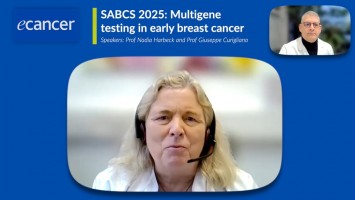WCCS 2016
Metabolic regulation of melanoma cells
Dr Victoria Sherwood - University of Dundee, UK
I’m talking about the role of wnt signalling in the metabolic reprogramming of melanoma cells. So we’ve worked for a number of years on two arms of the wnt signalling pathway, both the canonical and the non-canonical wnt signalling pathways and we’re looking at how this wnt signalling network can metabolically re-programme melanoma cells to have an effect on metastatic potential of the melanoma tumours. Wnt ligands can signal in a β-catenin dependent or independent manner, sometimes referred to as canonical or non-canonical in the literature.
How do the pathways vary, and what are their impacts?
The effects, as I said, are very context dependent so wnt pathways themselves are highly complex redundant pathways used in developmental biology. So the effects that they have are very much dependent on the cell type and expression of the proteins within those cells in a context-dependent manner. So what we’ve been looking at in terms of the wnt β-catenin pathway, the canonical wnt pathway is the effects it has on metabolism based on PTEN expression within those tumours. So there’s a marked difference on the metabolic effects of wnt β-catenin signalling depending upon PTEN expression. So in the presence of PTEN what we’re finding is that wnt β-catenin signalling is able to supress global metabolism in those tumour cells which doesn’t occur when you don’t have PTEN expression. What we’ve found through further investigations is that this is a primary defect in mitophagy in those cells. So in the PTEN expressing melanoma cells if you stimulate with wnt β-catenin, if you stimulate the wnt β-catenin pathway, what happens is that you get an effect that blocks macroautophagy and actually blocks mitophagy in those cells. It appears that the cells are unable to maintain a healthy pool of mitochondria and therefore maintain energy metabolism to an effective level. This has a direct effect on the metastatic potential of those tumours. This doesn’t occur in cells that don’t express PTEN so what we believe is that PTEN expressing melanoma lines are essentially autophagy addicted and so the effects that we see are only present in those cells specifically.
From a clinical perspective, how can these pathways be used to identify vulnerabilities in subgroups?
It’s quite controversial at the minute what the role of the wnt β-catenin signalling pathway is in melanoma. I highlighted in my talk that some studies have suggested that it can be pro-metastatic and act as essentially an oncogenic pathway and others suggest that high levels of nuclear β-catenin is actually good for patient prognosis. So there’s a real controversy in the literature at the minute so what our work is doing is trying to delineate why there’s those discrepancies and we believe that a basal metabolism difference could be occurring in cells depending on PTEN expression. So we believe from our results that PTEN can really decipher whether or not the cells are going to respond to wnt β-catenin in a highly migratory and metastatic manner or not. So it appears to be context dependent based on PTEN. The underlying difference is a basic metabolic switch that occurs in cells that express high levels of PTEN; it’s not always clear-cut whether it’s pro-oncogenic or not.
Now, it’s difficult, for the wnt β-catenin pathway, predominantly it’s always been seen as a very pro-oncogenic pathway in a variety of tumour types, certainly in carcinomas. But in melanomas, which derive from a different cell type and are basic epithelial cells they’re not a carcinoma, we see this differential effect of β-catenin signalling. So it’s not as clear cut as it is for certain tumours, for example like colorectal tumours where definitely if you have high levels of β-catenin it’s very bad for patient prognosis. In melanoma we see controversy in the literature, discrepancies based on β-catenin signalling.
What are your thoughts on the conference?
The conference as a whole has been very interesting in terms of new therapies coming through and being promoted for melanoma patients. Melanoma patients, generally their future is much brighter than it used to be only a few years ago in terms of the new targeted therapies but particularly the immunotherapies that are coming out for patients, those are having really exciting results. So it’s an exciting time to be working in melanoma and to really be understanding the context of how the therapeutic field is moving along and how fast it’s moving, it’s a real highlight for this meeting.








